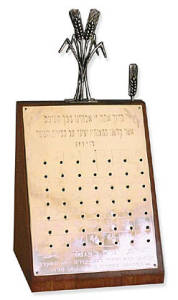As Shavuot celebrates the giving of the Torah on Mount Sinai, counting the days between Passover and Shavuot is seen as preparation for this awesome event.
We now find ourselves in the period of “The Counting of the Omer”, or in Hebrew, Sefirat Ha’omer. The counting of the Omer is an important mitzvah (commandment) according to which we verbally count the days between Passover and Shavuot. As the Torah says:
“You shall count for yourselves – from the day after the Shabbat [Passover], from the day that you bring the Omer offering – seven Sabbaths. They shall be complete. Until the day after the seventh Sabbath, you shall count fifty days… (Leviticus 23:15-16)”
“You shall count for yourselves seven weeks…and then you will observe the Festival of Shavuot (Deuteronomy 16:9-10).”
As one can see from the verses cited above, the counting of 50 days from Passover to Shavuot is related to the “Omer” offering. The Omer offering was an omer (a dry measure equal to about 3.5 liters) of barley offered in the Holy Temple in Jerusalem on the second day of Passover. At the conclusion of the count, on the holiday of Shavuot, a new offering of wheat was brought to the Temple.
When observing Sefirat Ha’omer, both the days and the weeks are counted. For example, the 23rd day of the Omer is counted as follows: “Today is 23 days, which is three weeks and two days into the Omer.” The count is best recited in Hebrew, but one who does not understand the Hebrew may count in his or her own language.

Sterling-silver omer counter. (worldofjudaica.net)
“Omer-counters” can be found in many homes, and they make popular gifts. These counters may be decorative boxes with an interior scroll that shows each day’s count through a small window, posters, peg boards, SMS services, email groups, magnets, tear-off calendars and all kinds of creative items intended to remind and encourage one to count the Omer each night.
There are many interpretations on the meaning and importance of this nightly count. As Shavuot is the holiday when we celebrate the giving of the Torah on Mount Sinai, it is explained that counting the days between Passover and Shavuot is a daily preparation for this special holiday. Indeed, it is taught that on Shavuot one should feel as if he or she was actually present when God gave the Torah at Sinai. Furthermore, it is considered important to connect the holidays of Passover and Shavuot in a number of symbolic ways, in this case with the daily count. The connection between these holidays is that the primary reason that God took us out of Egypt was in order to give us the Torah and have us observe its commandments. For this reason, character improvement is emphasized during this time, as we are taught that being a kind and caring human being is a prerequisite to being one of the Chosen People.
It is interesting to note that there is a dispute among the rabbis as to whether there continues to be a Torah requirement to count the Omer each night. This is because, according to many authorities, the mitzvah of counting the Omer is only in force when the actual Omer offering is brought to the Holy Temple. As such, since there is no Temple in Jerusalem today, and by extension no offerings, and therefore many authorities rule that there is no longer a mitzvah to count the Omer. Other authorities rule that the mitzvah of bringing the Omer offering to the Temple and that of counting the days between Passover and Shavuot are two distinct and independent commandments. According to this approach, although there are no offerings nowadays, the mitzvah to count each night remains relevant.
All authorities agree, however, that one is nonetheless required to count the Omer each night. The only question, as mentioned, is whether the obligation is biblical or rabbinical.
By: Rabbi Ari Enkin





